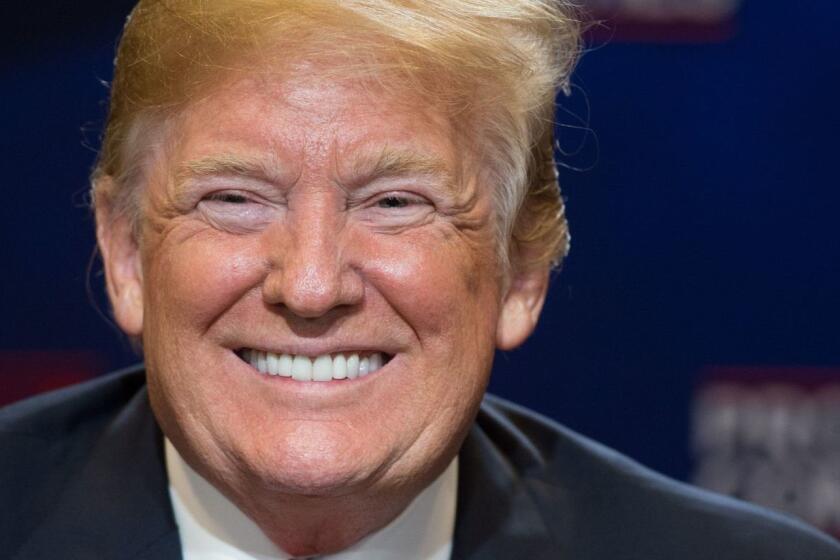Documentary film groups sue U.S. over social-media requirement for visas
- Share via
Two organizations that support documentary filmmakers are suing the secretary of State and acting secretary of Homeland Security, arguing that requiring visa applicants to submit social media identifiers violates their members’ rights, hampers filmmakers’ freedoms of speech and association on social platforms and hurts the organizations’ ability to engage with documentarians from around the world.
The case — filed Thursday in Washington, D.C., District Court against the State Department’s Michael R. Pompeo and DHS’ Chad Wolf — was brought on behalf of the Brooklyn-based Doc Society and L.A.-based International Documentary Assn. by the Brennan Center for Justice, the Knight First Amendment Institute at Columbia University and Simpson Thacher & Bartlett LLP.
On May 31, the State Department started requiring social media identifiers on visa applications in response to a March 2017 executive order signed by President Trump whose stated aim was to improve immigration and travel screening and vetting processes. Executive order 13780 had revoked and replaced an order from January 2017 that came to be known as the travel ban.
An estimated 14.7 million people per year are affected.
Nearly all visa applicants must now provide all usernames, including pseudonyms, that they’ve used in the past five years on numerous social media platforms.
‘The Cave,’ ‘Apollo 11,’ ‘Honeyland’ and ‘Sea of Shadows’ explore vastly different worlds with equal intensity
“Because of the [requirement], some of Plaintiffs’ members and partners now use social media more cautiously, use it less, or no longer use it at all for speech that could be construed as controversial or political,” the complaint reads.
In addition, it says, some filmmakers who had considered applying for visas to visit or work in the United States had decided against doing so, to avoid having to surrender their social media information to the U.S. government.
“We regularly work with filmmakers for whom the ability to maintain anonymity online can be a matter of life and death,” Doc Society Inc. director Jess Search said in a release. The group supports documentarians and connects them with global audiences.
“As an organization committed to filmmaker safety, we believe the registration requirement is a deeply troubling and oppressive development,” she continued, “forcing filmmakers to choose between free online expression and their own security.”
Twitter stated its opposition to the new rule on Thursday.
“Twitter is committed to fostering free expression and public conversation for everyone — that includes protecting the right of people to speak anonymously without fear of reprisal or retribution,” the company’s public policy account tweeted.
“Collecting social media identifiers from visa applicants, including personal Twitter handles, has a chilling effect on that conversation. For these reasons, we remain strongly opposed to the U.S. Department of State’s social media registration requirements.”
The Supreme Court handed President Trump the most significant legal victory of his presidency on Tuesday, upholding the administration’s ban on foreign visitors and immigrants from several mostly Muslim countries.
Simon Kilmurry, executive director of the membership-based IDA, said in the release that some filmmakers already had decided against applying for visas and therefore hadn’t participated in recent U.S. film festivals.
“In our increasingly global world,” he said, “the meaningful exchange of ideas and perspectives should be celebrated, not stifled.”
In 2018, a producer and two cinematographers on the Oscar-nominated documentary “Last Men in Aleppo,” all from Syria, struggled with visa issues on their way to the Academy Awards, finally getting a “yes” after the State Department reversed its decision just days before the ceremony.
A year prior, the winner of the Oscar for foreign-language film was not present to collect his statue. Iranian filmmaker Asghar Farhadi, who directed “The Salesman,” boycotted the event, which happened shortly after the original executive order was signed.
All that happened before the social media registration requirement went into effect.
The new lawsuit asks that the social media requirement be declared unlawful and that enforcement of it be stopped.
More to Read
Only good movies
Get the Indie Focus newsletter, Mark Olsen's weekly guide to the world of cinema.
You may occasionally receive promotional content from the Los Angeles Times.












